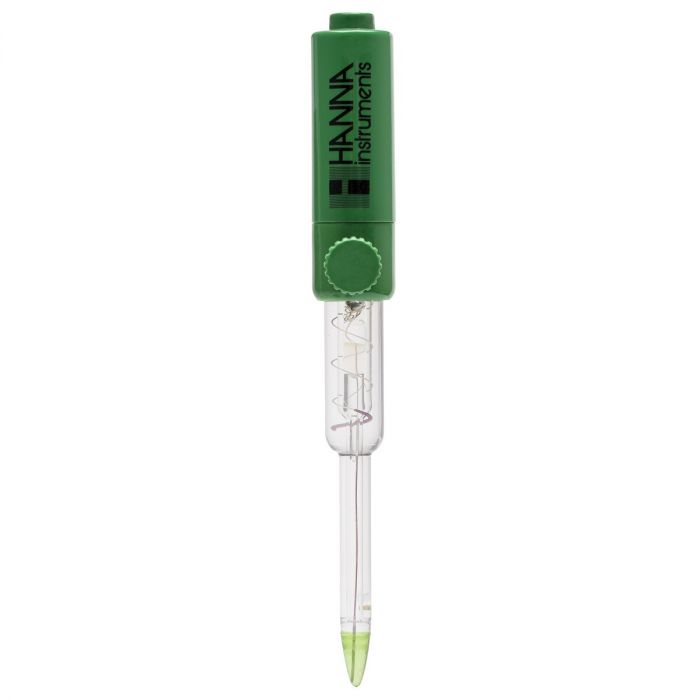Local Storage seems to be disabled in your browser.
For the best experience on our site, be sure to turn on Local Storage in your browser.
Spear Tip pH Electrode for Semi-Solid Samples with BNC Connector HI2031B
The HI2031B is a glass body, refillable, single junction pH electrode with a BNC connector. This electrode has a single ceramic junction in the outer reference cell and the conical pH sensing portion is made with low temperature glass. This design consideration is ideal for emulsions, dairy products, semi-solid samples, and for measuring samples at cooler temperatures.
- Conical Tip
- Low Temperature (LT) Glass
- Refillable Electrode
| Manufacturer | Hanna Instruments |
|---|---|
| Electrodes Parameters | pH |
| Electrode Connection | BNC |
| Hazardous | No |
| Note | Ships with heat pack(s) during winter months. |
| Description | refillable, conical tip combination pH electrode |
| Reference | single, Ag/AgCl |
| Junction / Flow Rate | ceramic, single / 15-20 µL/h |
| Electrolyte | KCl 3.5M + AgCl |
| Max Pressure | 0.1 bar |
| Range | pH: 0 to 12 |
| Recommended Operating Temperature | -5 to 70°C (23 to 158°F) - LT |
| Tip / Shape | conic (6 x 10 mm) |
| Temperature Sensor | no |
| Amplifier | no |
| Body Material | glass |
| Cable | coaxial; 1 m (3.3’) |
| Recommended Use | dairy and semi-solid products |
| Connection | BNC |
Hanna Instruments offers a wide variety of pH electrodes that are designed for many different applications. The type of glass used for sensing pH, bulb shape, body material, type of junction, type of reference and electrolyte used are just some of the design considerations.
The HI2031B uses low temperature (LT) glass, conical bulb, glass body, single ceramic junction and is refillable with 3.5M KCl + AgCl.
Low-Temperature Glass Formulation
The measurement of pH at very high temperatures is detrimental to the sensitive glass bulb and will shorten the life of it. A pH electrode with general-purpose (GP) glass will have a resistance of 100 megaohms at 25°C while the resistance of LT glass is around 50 megaohms at 25°C. As the temperature of the glass decreases in the sample, the resistance of the LT glass will approach that of GP glass. If using GP glass, the resistance would increase above the optimum range, resulting in increased impedance and ultimately affecting the measurement. The HI2031B is suitable to use with samples that measure from -5 to 70°C.
Conical Glass Tip
The conical-shaped tip design allows for penetration into solids, semi-solids, and emulsions for the direct measurement of pH in food products including meat, cheese, yogurt, and milk.
Glass Body
The glass body is ideal for laboratory use. The glass is resistant to many harsh chemicals and is easily cleaned. The glass body also allows for a fast transfer of heat to the internal reference electrolyte. The mV generated by the reference cell is temperature-dependent. The faster the electrode reaches equilibrium, the steadier the reference potential.
Single Ceramic Junction
The outer junction of an electrode, also known as a salt bridge, is a necessary component of the electrical circuit. The movement of ions must flow through the junction for a steady reading. The outer reference has a single ceramic frit. The ceramic is a porous material that is easily fused with the glass body and has a similar expansion coefficient. A single ceramic junction has a flow rate of 15-20 μL/hour. Other junction types are available with higher flow rates and made with different materials.
Refillable
The HI2031B is a refillable probe. Since it is a double junction pH electrode the fill solution is the HI7071 3.5M KCl + AgCl. If using a refillable pH electrode, the fill cap should be removed prior to calibration and measurement. Removing the cap creates positive head pressure in the reference cell allowing for higher flow rate of electrolyte through the outer junction. A higher flow rate will result in a faster and more stable reading.
BNC Connector
The HI2031B uses a BNC connector. This type of connector is universal in that it can be used on any pH meter that has the female BNC probe input. Other types of connectors include DIN, screw type, T-type, and 3.5mm to name a few. These types of connectors tend to be proprietary for a particular type of meter and are not interchangeable.

